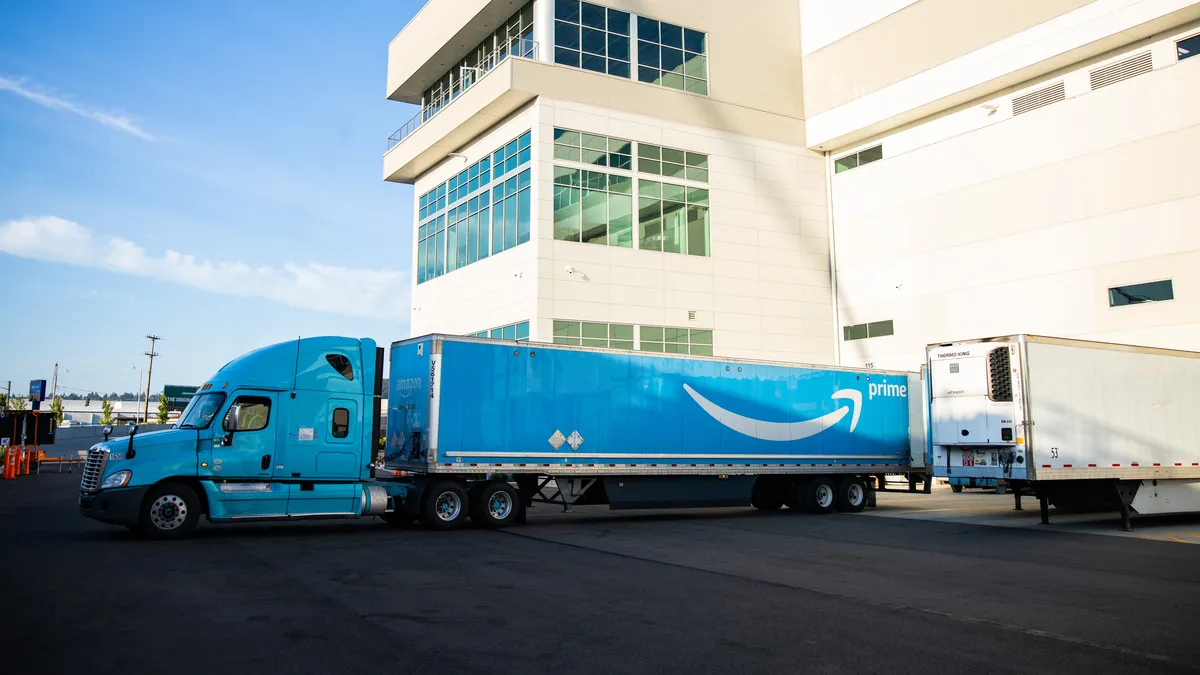Dive Brief:
- Amazon lashed out at Congress and defended its business practices in a blog post tied to proposed legislation that aims to prevent abuses and reduce conflicts of interest among the largest platform companies, including Amazon, Google and Facebook.
- In the post, Brian Huseman, Amazon vice president of public policy, said that if turned into law it could force the company to allow other logistics providers to service Prime orders sold by third-party sellers.
- Huseman also complained that because the bill applies to those companies with market caps of more than half a trillion dollars, along with other criteria, it "inappropriately" is "targeted at only one U.S. retailer — Amazon."
Dive Insight:
Shifting attitudes around antitrust issues in both major U.S. political parties has been a headache for Amazon that has only grown with time and the company's size. The big tech legislation introduced in both the Senate and House of Representatives is just the latest potential salvo in various run-ins between the company and government.
In Huseman's post, and in past statements by the company and executives, Amazon has maintained that its market should be viewed as the same as other mass merchants and retailers. Viewed by all the categories it sells in, the company that has long aimed to be the "everything store" has a relatively small share of the total retail market, of which e-commerce is still just a fraction. That also makes it, Huseman argued, different from the other tech companies targeted in the bill.
"In reality, Amazon’s Consumer business (which this proposed legislation is largely aimed at) has much more in common with thousands of other retailers, like Walmart, Target, and Costco, all of which would be mysteriously excluded from the bill’s proposed regulations," Huseman wrote.
In e-commerce and online marketplaces, Amazon's dominance is well-established and seemingly invincible despite the billions of dollars invested by Walmart, Target and other retailers. Amazon as a whole is set to capture nearly 40% of the e-commerce market in 2022, or $2 of every $5 spent, according to eMarketer. The next 14 largest digital retailers are left to divvy up another 31%, with the entire rest of the internet retailing universe making up the balance of share.
According to Marketplace Pulse, Amazon’s third-party marketplace accounts for 25% of all e-commerce in the U.S. In terms of traffic, visits to Amazon were nearly triple those of its next closest marketplace rival, eBay, and more than five times the visits to No. 3 Walmart, according to Statista data.
Huseman also focused on the consumer benefits to Amazon's platform and operations. "Prime is much more than a membership program — it’s become a service people love and rely on," Huseman wrote. Fulfillment by Amazon, the company's internal logistics service, allows its third-party sellers to offer products with Amazon's two-day delivery promise for Prime.
"Sen. [Amy] Klobuchar’s vaguely worded bill would mandate that Amazon allow other logistics providers to fulfill Prime orders," Huseman wrote, adding that Amazon has tried to allow outside logistics providers to fulfill Prime orders but "unfortunately, these providers were not able to consistently deliver in the timeframes Prime customers have come to expect."
The legislation under consideration follows a long investigation into Amazon and other dominant tech platforms, the resulting report of which accused Amazon of exploiting seller data and other abuses of its market power in online commerce.
Earlier this year, the House referred Amazon to the Department of Justice on allegations that executives lied about the company’s use of seller data and “manipulation of consumers’ search results” during the House investigation. Amazon said at the time there was no "factual basis" for the referral.
















